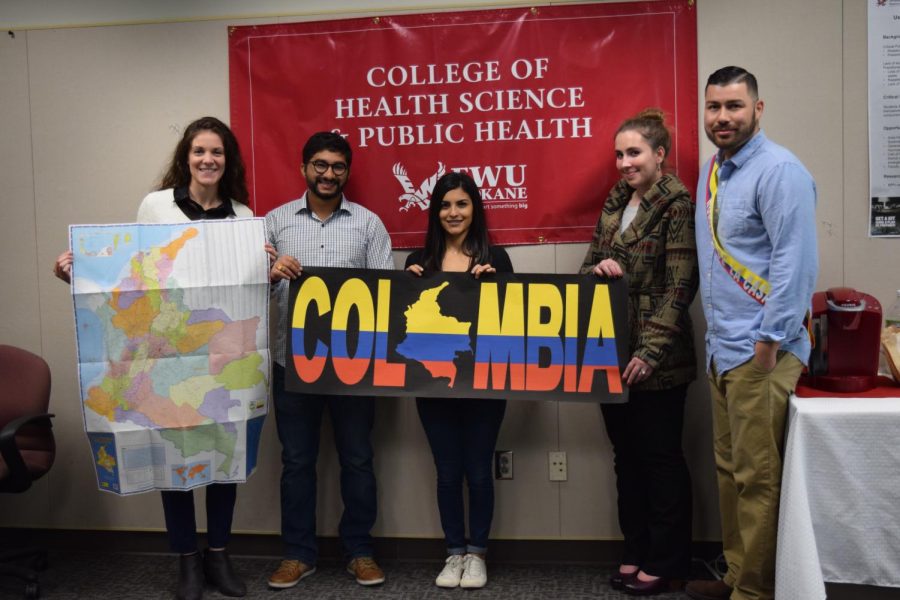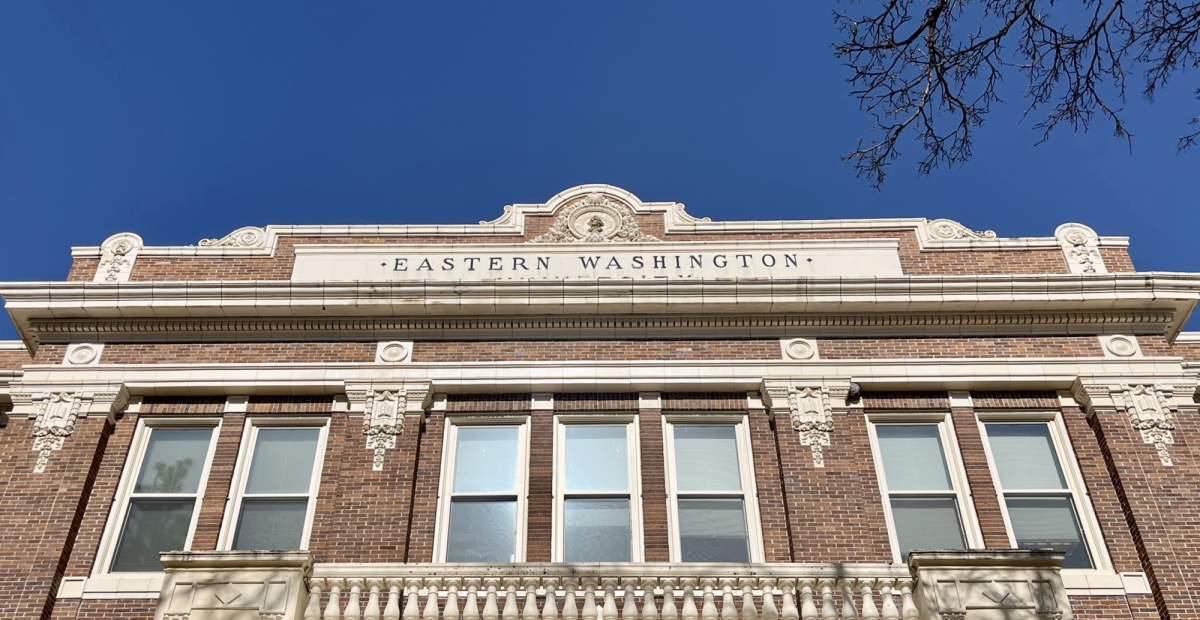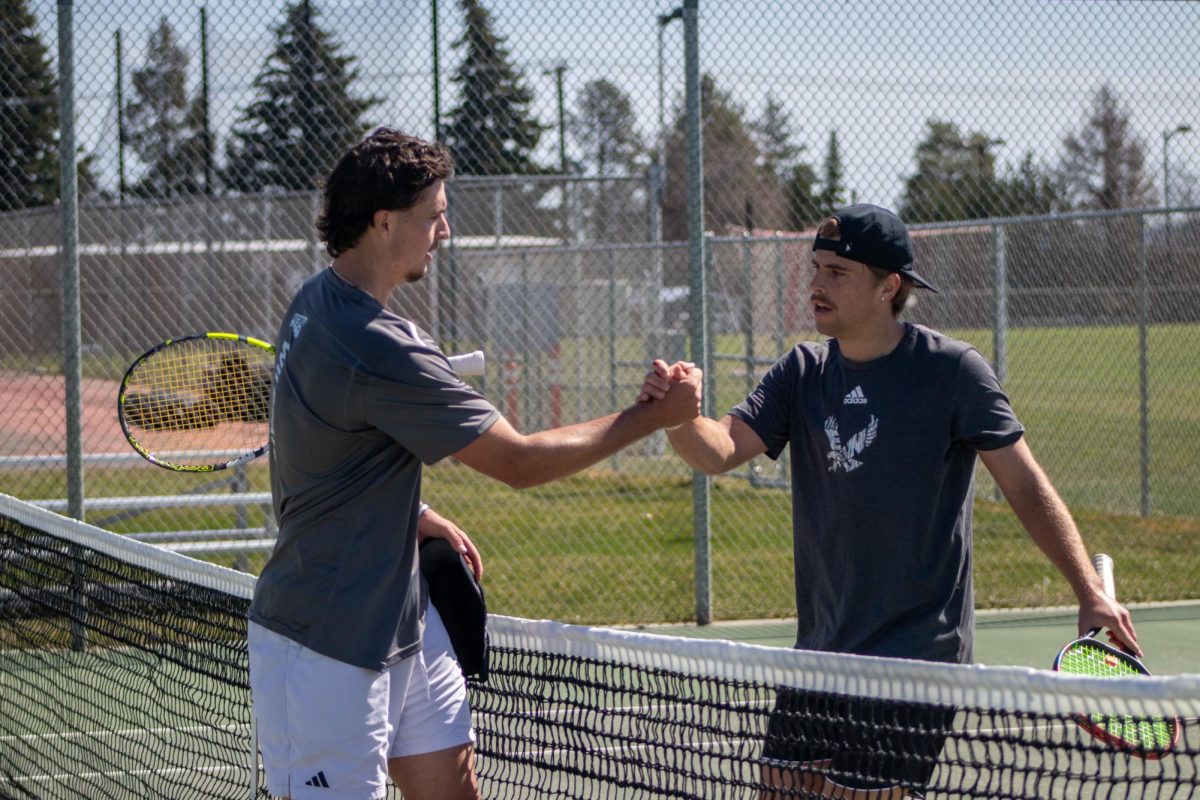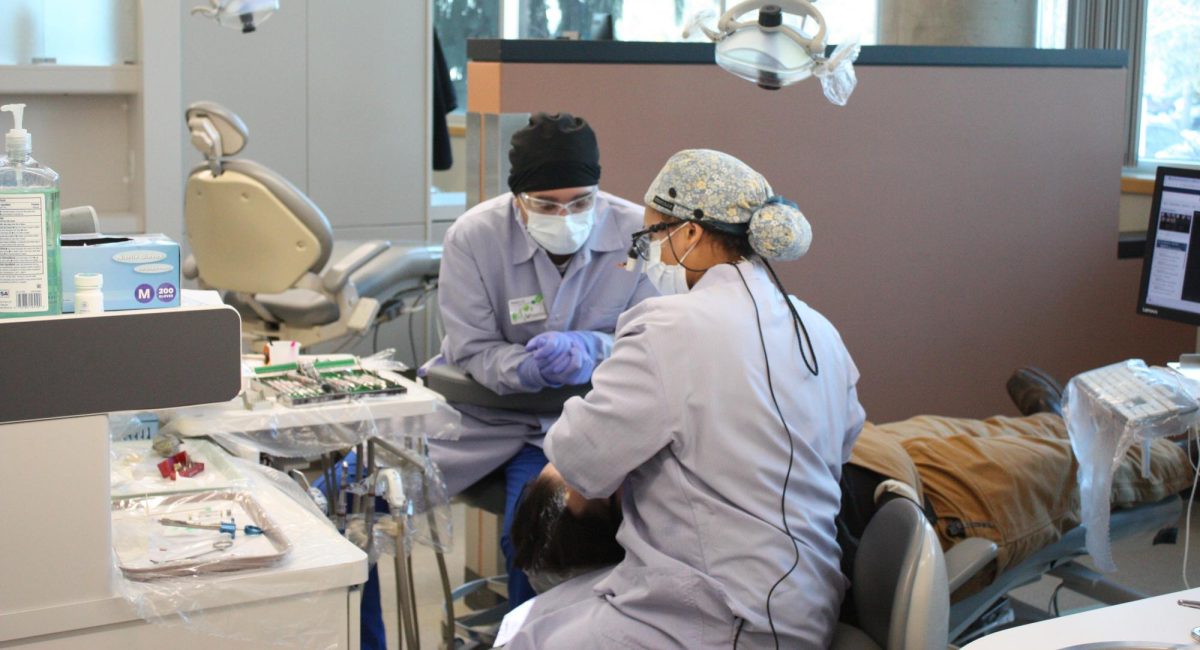EWU and Bogatá University students partner
Ten years of partnership with Public Health program has impacted healthcare
EWU graduate student assistants Victoria Senechal, Dill Gautam, Jessica Ochoa, Zoe Dugdale, and Guillermo Mendez (above) pose for a picture. The Master of Public Health Students are traveling to Colombia fora ten-day visit to help develop a community health assessment by collecting data from surveys, interviews and focus groups | Photo courtesy of the College of Health Science & Public Health
April 19, 2018
Five ambitious EWU Master of Public Health students are seeking to make monumental impacts on post-civil war Colombia.
At the crown of South America’s head exists a country traumatized by the same horrors that have sent countless U.S. soldiers overseas in recent years: homicides, massacres, abductions, torture, use of mines and explosives, child recruitment, sex crimes, forced dispossession and displacement of land.
Civil war has devastated the country of Colombia since 1964. Although the war came to a close in 2016, the country (especially rural communities) has suffered consequences of the conflict manifested through significant socio-cultural disintegration and poverty, and the conditions of the Colombian people themselves facing a number of mental and physical illnesses.
“A lot of people there have been damaged in many ways, like economic[ally], [and by] loss of people and families. It is a lot of psychological damage for them,” Colombian foreign exchange student Sergio Daniel Cardona said.
It is estimated that there are approximately 7.67 million total Colombian-civilian victims.
“It’s like a quiet war: You don’t see it, but it’s there,” Natalia Perez Machado, also a Colombian medical foreign exchange student, said.
For the five EWU Master of Public Health Graduate Student Assistants Victoria Senechal, Jessica Ochoa, Zoe Dugdale, Dilli Gautam, and Guillermo Mendez– and six Colombian foreign exchange medical students— Natalia Perez Machado, Sergio Daniel Cardona, Luisa Mejia Roa, Andres Ramirez, Carlos Mario Perdomo and Daniel Zamora Torres—efforts to build up Colombian victims from their country’s previous atrocities are not done by the methods of violence or boots on the ground that Colombians have witnessed the past half-century.
EWU’s Master of Public Health department associated with Juan N. Corpas University, located in Bogotá, Colombia, in 2008. After years of assessment on conditions of post-conflict Colombia, the Colombian university proposed a program to diversify its educational methods and produce competent individuals capable of impacting the policies depriving many rural Colombians of desperately-needed healthcare today.
Juan N. Corpas reached out to EWU for assistance in this initiative. The Office of Global Initiatives at EWU, headed by Dr. Megan Abbey, endorsed the Colombian university. In May 2017, EWU and Juan N. Corpas were awarded the 100,000 Strong in the Americas Innovation Fund.
After an extensive application process, the six Juan N. Corpas medical students were chosen to travel from Colombia to Cheney to participate in medical internship, online education and dialogue with the five EWU GSAs.
“It’s good to know another culture—another kind of health services. The medicine is the same in all the world, but each country, each state, even each town, has their own way to try to give health to their populations,” said Cardona. “We are working to find different ways to improve the rural health in Colombia, and how the government of our country can give us support, so in that way we can help them.”
MPH student Victoria Senechal, one of the five GSAs, is heading the project that holds much complexity under the guidance of Dr. Mary Ann Keogh Hoss, who maintains direct communication with Juan N. Corpas. Senechal’s duties include online class operations, research on Colombia, and grant objective orientation. Her skills in translation have also helped immensely to push the project forward.
“Currently, clear inequalities exist in health access and outcomes between rural and urban areas of Colombia,” said Senechal in an email interview. “Health programs can contribute to the restoration of rights, restoration of health, reconstitution of family ties and social inclusion.”
In the collaboration between the two universities, the project aims to provide eminent educational and career opportunities to EWU and Juan N. Corpas graduate students, strengthen the relationship of the two institutions, and produce a jointly-written policy proposal urging Colombia’s legislative body to implement better healthcare strategies for rural Colombian victims.
The six Colombian students are inspired to contribute to the project based on what they have seen in their own country.
“The main idea is to recover all communities affected,” said Roa. “I really feel that it has been affecting me too, because I am Colombian and I feel it by the heart.”
The project has taken significant research and productivity on all ends and a thorough investigation of Colombia, to construct a satisfactory policy proposal. This does not stop at the comforts of a college campus.
On May 6, MPH students will land in Colombia to engage directly with the things just words on a page to them before.
The MPH students’ ten-day visit to Colombia will put their attention into the development of a community health assessment to enhance the finalized policy proposal. Conducting surveys and interviews while establishing focus groups, the team will obtain data from both urban and rural communities to get a more complete picture on the disparities of health outcomes.
Colombian students will return with the MPH students to their home country. They will complete further research in the town of Algeciras, one town heavily impacted by the war.
“Once we are in Colombia, no two days will look alike,” Senechal said.
All the measures of preparation have not blinded the MPH students to some of the obstacles that might present themselves over the course of the trip.
Language barriers, first off, might prove difficult to overcome even with language training.
“Translation is not necessarily the same thing as interpretation. There is a lot lost in translation and those on the team who can only manage one of the two languages get extremely frustrated,” Senechal said.
The students are not entering a territory free of threat. A post-war country opens up the possibility of encountering land mines, guerilla fighters and civil unrest as well as vulnerability to disease such as malaria and yellow fever.
All concerns aside, the hopes for the outcomes of this project remain high for everyone involved.
“Locally in Colombia, I want to see this bring hope to the victims and rural people in communities that have been struggling for years,” said Senechal. “Nationally, I hope this stirs up the local and national Colombian government to do something lasting that brings about stable peace and true health reform. Practically, I hope the government funnels more health professionals, programs and money into rural areas with the highest level of need and makes some positive changes to the current health system.”
The six Juan N. Corpas students have expressed satisfaction so far with their experiences working with EWU.
“This has really opened my mind to a new culture,” said Torres. “It is nice to get out of my comfort zone and really get to know people and their thoughts.”
The outcomes of this project also have the potential to inspire other EWU students to get involved in similar pursuits.
“I think it helps that there have been some positive outcomes of the work we are doing and most students are looking to travel and learn more about other countries and cultures,” said Senechal. “Hopefully, EWU will create more GSA positions like mine to work on existing projects like this one and maybe other programs will go out to find ways they can get involved through study abroad programs.”
It is a small group of EWU graduate students driving a program that has the possibility to impact thousands, or even millions, of lives. Where EWU students could take their influence next, the world is the limit.








